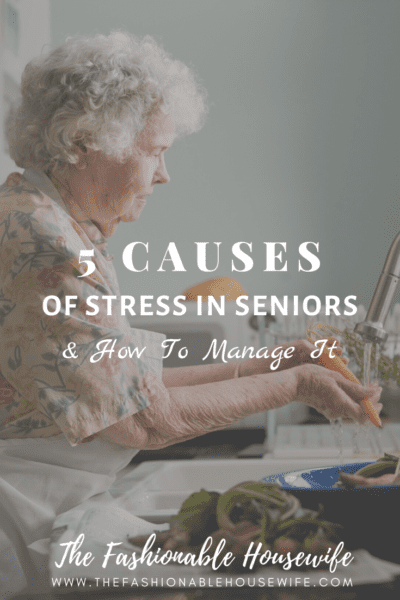
Everyone handles stress in different ways but everyone experiences it at some point in their life. As we age, coping with stress can become harder and people tend to have less resilience to it. Older adults often find that stress affects them differently to when they were younger, so why is this?
One reason is that the cells in the body are ageing. Seniors find it harder to bounce back after surgery because it takes longer for the body to recover. Another reason is different triggers for stress. Common stressors for young people include having a busy day at the office or a crying baby but older people experience stress due to loss of physical ability or loss of a loved one.
Here are five major causes of stress in seniors and how to manage them.
Financial problems after retirement
Lack of money can be a massive stressor for older citizens especially if the economy takes a turn for the worse. Many seniors who have invested in shares could suddenly see themselves moving from being financially well off to carefully watching their own spending. It’s also hard to factor in costs that may occur in the future, such as medical bills or increase to the cost of living.
How to manage it: It’s not always easy to talk about money, especially if you are stressed about your finances but speaking to someone is the best way to deal with it. Depending on where you live, find out if you’re eligible to speak to a financial councillor for free. Financial counselling is confidential and independent.
Caring for grandchildren
It’s hard enough getting old without having to run after a boisterous five-year-old. As childcare costs rise, more parents are getting help from their elderly parents. In England, at least 80% of grandmothers with a grandchild under 16 provide childcare to help their adult children cope. This is stressful for the grandparents as they may have to dip into their savings to look after their grandchildren.
How to manage it: Be clear on the arrangements with your adult children before agreeing to help out. For example, if you get tired early in the evenings say that you can only take the grandkids in the morning. Another problem for older adults is that some may have low immunity to diseases, so explain that you can’t take the grandchildren if they are sick and will have to wait until they recover.
Death of a loved one
This is a particularly life-shattering experience, especially if it’s the loss of a spouse. The death of a person close to an older citizen can cause not only psychological impacts such as depression, grief and stress but physical consequences such as sleeplessness and loss of appetite. The person may worry about their safety being alone in the home or social isolation.
How to manage it: It always takes time to overcome grief so the best thing to do is have someone you can talk to, whether that’s your children or a close friend. You should discuss your concerns about social isolation and safety. Organise regular times for your family to come around to visit you or find a hobby that involves leaving the house so you can socialise with other seniors.
Deterioration of physical abilities
As people age, their bodies show down and they aren’t able to keep up with life as they used to when they were younger. Elderly people may start to worry about injuring themselves due to a fall or from carrying heavy items that used to be easy to manage. Adjusting to new physical limitations can be a daunting challenge.
How to manage it: If you’re worried about your physical strength or how to keep your joints health, consider doing tasks in smaller loads. Putting too much strain on your body will only cause you to become more stressed, so take it easy. Consider buying a personal alarm if you’re worried about having a fall in the home or outside and remove any trip hazards in your house such as books or newspaper lying on the floor.
Worried about institutionalisation
Most older people become worried at the idea of being put into a nursing home or living in a retirement village and it’s understandable when they’ve lived an independent existence for their whole life. However, family members are worried about their elderly parents or grandparents living at home by themselves especially if they have pre-existing medical conditions or suffer from dementia and see nursing homes as a way for them to get constant care.
How to manage it: Talk to your family if you’re worried that they’re planning to put you into a nursing home. Express that you don’t want your independence taken away and that you’d prefer to stay in your home. There are many options available for in-home care, which allows elderly people to still receive care but to still have the freedom to live at home.
Guest Blogger: Karen Smith has been working for MePACS as the Head of Sales and Marketing for the last four years and has over 20 years experience in health, technology, digital and finance industries.



